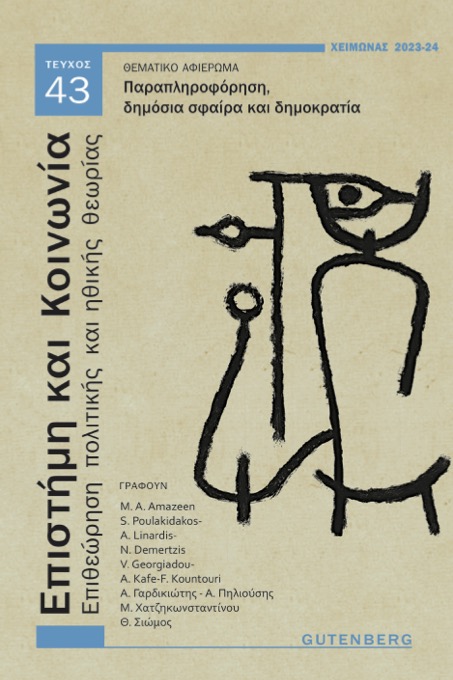Fake news, fact-checking και προπαγάνδα στον κοινοβουλευτικό λόγο
Abstract
Political fact-checking is utilized in the public debate and academic research in pursuance of tackling false content. However, it seems that these processes are neglected in terms of their potential to demonstrate the blanket, accusatory and essentially propagandistic use of the term “fake news” in political discourse. On this basis we studied such statements made in plenary sessions of the Hellenic Parliament and we detected propagandistic forms of parliamentary discourse which are grounded on the disconnection of accusations of distortion/falsification from the logical requirement of their explicit and substantiated verification.
Article Details
- How to Cite
-
ΧΑΤΖΗΚΩΝΣΤΑΝΤΙΝΟΥ Μ. (2024). Fake news, fact-checking και προπαγάνδα στον κοινοβουλευτικό λόγο. Science and Society: Journal of Political and Moral Theory, 43, 134–160. Retrieved from https://ejournals.epublishing.ekt.gr/index.php/sas/article/view/33350
- Section
- Articles

This work is licensed under a Creative Commons Attribution-NonCommercial-ShareAlike 4.0 International License.
Authors who publish with this journal agree to the following terms:- Authors retain copyright and grant the journal right of first publication with the work simultaneously licensed under a Creative Commons Attribution-NonCommercial-ShareAlike License that allows others to share the work, not for commercial purposes, with an acknowledgement of the work's authorship and initial publication in this journal. If you remix, transform, or build upon the material, you must distribute your contributions under the same license as the original.
- Authors are able to enter into separate, additional contractual arrangements for the non-exclusive distribution of the journal's published version of the work (e.g., post it to an institutional repository or publish it in a book), with an acknowledgement of its initial publication in this journal.
- Authors are permitted and encouraged to post their work online (e.g., in institutional repositories or on their website) prior to and during the submission process, as it can lead to productive exchanges, as well as earlier and greater citation of published work (See The Effect of Open Access).



